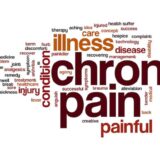Chronic pain and LTD benefits.
Have you been suffering from recurring pain for a lengthy amount of time? Are you experiencing pain from an injury that should have healed months, perhaps even years ago? Is that pain disrupting your life emotionally and physically? Are you finding it difficult to effectively perform your job as a result of this recurring pain? If you have been unable to work due to your chronic pain symptoms and you have long-term disability (LTD) coverage, you likely qualify for LTD benefits.
What is Chronic Pain?
Statistics show that approximately 6 million Canadians suffer from chronic pain, and according to the Chronic Pain Society, 1 in 5 adults in Canada suffer from this often-debilitating condition. Further, persons suffering from chronic pain have among the lowest quality of life among long-term conditions. So what exactly is chronic pain? In simplest terms, it is pain that persists much longer, months or years, than is reasonably expected. Chronic pain may affect a specific part of the body, particularly if it is the result of a previous injury, or it may occur in various parts of the body, sometimes at the same time.
Chronic pain is a condition onto itself and can result from a variety of causes. Some of the most common causes of chronic pain include: cancer; nerve damage; endometriosis in women; psychogenic pain (also known as psychosomatic pain, this is a pain condition caused by psychological issues and triggers); fibromyalgia (a chronic condition characterized by widespread pain); and injuries sustained as a result of an accident, such as motor vehicle accidents and falls.
Chronic pain may involve pain from an injury that persists long after the injury has healed or sometimes, the specific source of the pain may be unknown. Also, chronic pain can affect any part of a person’s body. Some of the most common forms of pain, according to Mayo Clinic researchers, are back and neck pain, headaches, joint pain, pain from nerve damage or injury, and pain due to cancer or fibromyalgia.
The complications of chronic pain often extend far beyond the physical pain. Persons suffering from chronic pain frequently have trouble sleeping as the pain can keep them up at night. Poor quality and nonrestorative sleep can result in constant fatigue and a reduced energy level. Ongoing fatigue and persistent pain can lead to depression, and a depressed mood can further reduce a person’s ability to perform their regular daily activities or function effectively at work. In addition to depression, chronic pain sufferers often experience heightened anxiety due to concerns with their pain and worries that they are no longer able to perform tasks as they previously did.
Claiming LTD Benefits for Chronic Pain
Long-term disability coverage provides income replacement for persons who are unable to work due an illness or injury, such as chronic pain syndrome. Anyone who has LTD coverage, whether provided by their employer, another group insurance plan or an independent LTD insurance policy, may be eligible for LTD benefits if they are unable to perform the essential tasks of their current occupation, due to the effect of their chronic pain symptoms. After two years, a person is eligible if they can show that, due to their condition, they are unable to perform any job for which they may be reasonably qualified, by way of education, training or experience.
The key to making a successful LTD claim for chronic pain generally rests on a claimant’s credibility. When a person’s pain is closely associated with an injury or known medical condition, they can generally provide objective medical evidence (for example, X-rays or medical test results) for their injury or illness which, in combination with a previously-established medical connection between the occurrence of pain and the given medical condition, can support the likelihood that the person is suffering real pain that interferes with their ability to perform given tasks. However, when chronic pain, such as fibromyalgia, is not associated with a known point of origin or cause, or persists far longer than expected, most, if not all, evidence is based on the sufferer’s communication of their pain and other symptoms. Accordingly, it is extremely important that the claimant is viewed as credible in their description of their pain and its effect on their life.
An important step to establishing credibility requires that the person suffering from chronic pain has sought medical attention for their physical and psychological symptoms, in order to obtain a professional diagnosis and get treatment for symptoms. The person must also show that they made a genuine effort to get better, such as by following their physician’s recommendations for treatment, which may include taking prescribed medication. Unfortunately, chronic pain can be difficult to treat, but establishing a pattern of consistency in an attempt to improve their condition will add to a claimant’s credibility.
As previously noted, a successful application for LTD benefits for chronic pain depends on a physician’s medical assessment substantiating that the claimant’s symptoms prevent them from performing the essential tasks of their job. But, because chronic pain is inherently subjective, a physician’s assessment of the severity and intensity of a person’s pain depends on the patient’s credibility when describing their symptoms, particularly in terms of being consistent and not seen as exaggerating their symptoms.
Although there are challenges in providing evidence of disability for a largely ‘invisible’ injury, chronic pain is, in fact, recognized in the medical community as a genuine condition that can result in long-term and even, permanent disability. If you have made a disability claim for chronic pain and your claim was denied or unfairly terminated, call an experienced disability claims lawyer. At Fishman Lawyers, we effectively represent clients whose LTD application was denied and we have the requisite expertise to resolve legal and evidentiary issues that stand in the way of establishing that your chronic pain meets the definition of ‘total disability’.
Contact us at: jan@fishmanlawyers.ca, for a free initial consultation.





